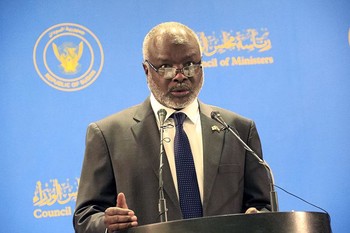JEM: ‘Sudan government dissolution violates Juba Peace Agreement’

Sudan’s Minister of Finance and head of the Justice and Equality Movement, Jibril Ibrahim (File photo: Sudan govt)
A senior figure in the Sudanese Justice and Equality Movement (JEM) has condemned the dissolution of Sudan’s caretaker government, warning it violates the 2020 Juba Peace Agreement and destabilises the fragile political process.
Mutasim Saleh, a leading JEM official, said “the complete dissolution of the government, including the peace ministers, is a clear violation of the provisions of the Juba Peace Agreement.”
His remarks followed Prime Minister Dr Kamil El Tayeb Idris announcement on Sunday, that he had dismissed the entire cabinet and handed executive duties to ministerial under-secretaries until a new government is formed.
The decision affects former rebel leaders who took ministerial roles under the 2020 peace deal. These include Dr Jibril Ibrahim, JEM leader and former Minister of Finance, and Mohamed Bashir Abu Nommo of the Sudan Liberation Movement – Minawi faction, who served as Minister of Minerals.
Saleh warned that “this measure not only affects the balance of power established by the agreement, but also threatens the credibility of obligations towards the parties to peace and undermines confidence in the path of political transition, which may affect the cohesion of the internal front under a very complex circumstance.”
In a post on Facebook, Saleh quotes Article 8.3 of the Juba Peace Agreement, he said it “constitutes a legal and political guarantee for the stability of the positions of the parties to the peace process within the institutions of government until the end of the transitional period,” and “expressly provided for those parties to retain the sites they had had obtained under the Agreement, and that no site would be vacant except in a replacement.”
Saleh stressed again that “the complete dissolution of the government, including the peace ministers, is a clear violation of this article, as it goes beyond the text and internationally agreed guarantees.”
He added the article “establishes the principle of tripartite partnership… which has now become a bilateral partnership after the exit of one of its parties,” warning that “ignoring this arrangement weakens existing commitments and undermines the foundation on which this partnership is based.”








 and then
and then